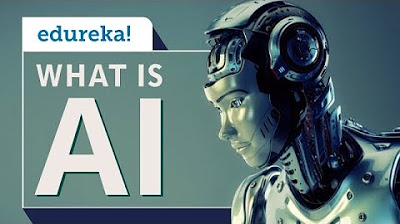The Impact of A.I. on Jobs | Rutika Muchhala | TEDxDSBInternationalSchool
Summary
TLDRThe speaker discusses the rapid impact of artificial intelligence (AI) on various careers, particularly in self-driving technology and sales. While AI has been around for decades, advancements in data collection, processing, and algorithms have made it more powerful. The speaker illustrates this with examples, such as AI replacing salespeople who are merely order-takers. They emphasize that jobs involving repetitive tasks are at risk, while creative, empathetic, and interpersonal roles remain less vulnerable. The key takeaway is that individuals need to adapt and embrace AI’s potential to remain relevant in the changing job landscape.
Takeaways
- 😀 AI has been around since 1956, with several booms and 'AI winters', but recent advancements have made it more impactful than ever.
- 😀 The rapid progress of AI is driven by easier data collection, faster processing power, and improved algorithms.
- 😀 AI's impact on industries like self-driving cars and job automation is becoming a reality, especially in sales and marketing roles.
- 😀 In sales, AI has reduced the need for 'order-takers', who have been replaced by AI-powered tools like Google search.
- 😀 By 2020, over 25% of sales and marketing-related jobs were expected to be lost due to automation and AI.
- 😀 The story of John and Jeff illustrates how adapting to new technologies (like AI) can determine career success or failure.
- 😀 Jobs that require rule-based, repetitive tasks are more vulnerable to automation by AI, while jobs requiring creativity or empathy are less likely to be replaced.
- 😀 AI can take over tasks we don't like (e.g., data entry or laundry), allowing humans to focus on more meaningful work.
- 😀 It’s essential for individuals to understand which tasks in their careers are vulnerable to AI and which ones require uniquely human qualities.
- 😀 Career adaptability is crucial, with those most likely to be impacted by AI being the ones who don't understand its potential impact on their work.
Q & A
How has AI's impact on careers been evolving over time?
-AI's impact on careers has been gradual, with its significance becoming more evident over the past few years. Despite AI being discussed since 1956, it was only in the last seven years that technologies, like self-driving cars, became viable due to improvements in data processing, faster computing, and new algorithms.
What is the role of data in making AI more powerful?
-Data is crucial for training AI, and its collection and processing have become easier thanks to better technologies. The availability of large datasets fuels AI’s ability to learn and make predictions, making it an essential driver of AI advancements.
Why did AI sneak up on many people in the workforce?
-AI's rapid advancement and the fact that many tasks once seen as secure were vulnerable to automation caught many off guard. People were not prepared for how quickly AI would affect industries, especially those relying on repetitive, predictable tasks.
What happened to John and Jeff in the story of sales jobs?
-John, who remained an order-taker, was laid off in 2019 as AI and information from platforms like Google replaced the need for traditional salespeople. On the other hand, Jeff continued to build relationships and expertise, becoming a consultant, which helped him thrive despite the rise of AI.
How did Google influence the job market for salespeople?
-Google’s ability to provide people with the relevant information they needed reduced the demand for salespeople who primarily took orders. This technological shift displaced around 65% of salespeople, particularly those who weren’t offering specialized expertise.
What type of tasks are at risk due to AI automation?
-Tasks that are rule-based, repetitive, predictable, and rote are at high risk of being automated by AI. Jobs involving data entry or basic service provision are examples of tasks AI can handle efficiently.
What types of jobs are likely safe from AI automation?
-Jobs that require creativity, empathy, and interpersonal skills are likely to remain human-driven for a long time. Roles such as artists, creative directors, therapists, and others requiring complex problem-solving or emotional intelligence are less vulnerable to automation.
What role do soft skills play in the future job market with AI?
-Soft skills, like creativity, emotional intelligence, and interpersonal communication, will be crucial in the future job market. These are areas where AI struggles to compete, ensuring that human workers can still find value in roles that demand these traits.
How can individuals adapt to the changes brought about by AI?
-Individuals can adapt by focusing on developing skills that AI cannot easily replicate, such as critical thinking, creativity, and emotional intelligence. Additionally, understanding AI and its implications can help people make informed career choices.
What tasks does the speaker suggest we can outsource to robots?
-The speaker suggests that tasks like data entry and laundry, which are repetitive and low-skill, can be outsourced to robots. This allows people to focus on more complex and creative aspects of their work.
Outlines

This section is available to paid users only. Please upgrade to access this part.
Upgrade NowMindmap

This section is available to paid users only. Please upgrade to access this part.
Upgrade NowKeywords

This section is available to paid users only. Please upgrade to access this part.
Upgrade NowHighlights

This section is available to paid users only. Please upgrade to access this part.
Upgrade NowTranscripts

This section is available to paid users only. Please upgrade to access this part.
Upgrade NowBrowse More Related Video

The Exciting, Perilous Journey Toward AGI | Ilya Sutskever | TED

Artificial Intelligence and the future | André LeBlanc | TEDxMoncton

Computer Concepts - Module 1: Impact of Technology Part 1 (4K)

INTELLIGENZA ARTIFICIALE spiegata in 30 minuti 🤖

What Is Artificial Intelligence? | Artificial Intelligence (AI) In 10 Minutes | Edureka

Artificial Intelligence | What is AI | Introduction to Artificial Intelligence | Edureka
5.0 / 5 (0 votes)